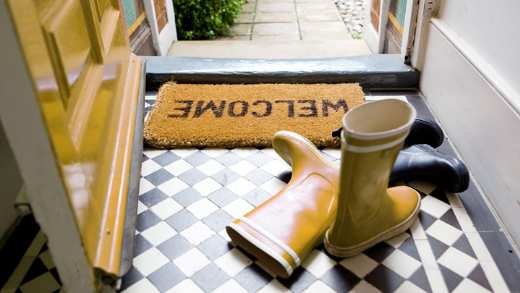
- Over 1,900 Aviva people in the UK have now taken equal parental leave at Aviva since the policy was launched in November 2017
- In 2020 99% of new Aviva dads took parental leave, with 84% taking at least six months
- In 2020 Aviva dads took on average 24 weeks’ paternity leave, three weeks more compared to 2018 (24 weeks v 21 weeks).
- Aviva parents said being able to take extended parental leave during the pandemic was vital to support their partner and new child when unable to access the usual help from family, friends and parenting groups.
- New research undertaken for Aviva by YouGov shows two in five parents with children under the age of 18 with childcare responsibilities would have welcomed extra support from their employer in the last 12 months.
Latest Aviva data reveals that take-up during lockdown compares well to pre-pandemic levels and new fathers are now taking more time off to spend it with their young families
Aviva’s equal parental leave continued to be popular during the Covid-19 pandemic, with strong take-up from Aviva colleagues. 643 employees took the leave last year, despite more families being based at home during 2020.
Over three years ago, Aviva became one of the first UK employers to launch an equal parental leave policy, offering new parents in its UK business 12 months’ parental leave, with six months at full basic pay. Since then, new figures from Aviva shows the number of men and women now taking leave is almost equal, although mothers continue to take more time with an average of almost 44 weeks off, compared to almost 24 weeks for fathers.
Aviva dads are now taking three more weeks’ paternity leave compared to when the policy launched. This suggests men are becoming more comfortable taking time out of work when a new child arrives and equal parental leave policies are becoming more established.
The need for more organisations to provide carers support, such as equal parental leave, is reflected in research undertaken by Aviva with YouGov, carried out online. This shows that over a fifth (22%) did not receive more flexible working arrangements and almost a fifth (19%) did not receive extra paid leave for caring responsibilities, but in both cases said these would have made childcare easier. And over two in three (67%) surveyed parents think the pandemic has increased employers’ responsibilities to do more for working parents.
Danny Harmer, Aviva’s Chief People Officer, said:
“Take-up of parental leave in 2020 shows it’s a benefit people really value and was a welcome reassurance to families facing into the stresses of a pandemic. Indeed, it proved to be essential for many colleagues while support networks, such as grandparents and parenting groups, were unavailable over the last 12 months.
“A key challenge with hybrid or remote working is that those with caring responsibilities – who are more likely to be women – become less visible unless organisations act consciously. Our hope is that policies like equal parental leave help to balance caring responsibilites between genders and remove any gender based or carer based barriers to career progression.”
"It proved to be essential for many colleagues while support networks were unavailable over the last 12 months."
Although the number of men and women taking parental leave is equal, it’s predominantly women who make contractual changes to working patterns on their return. One in five Aviva employees who took equal parental leave in 2020 requested changes to their working hours. Of these, nine in ten were female.
Danny Harmer continues:
“As we enter a new era for the workplace, with people working more flexibly than ever, it will be interesting to see how initiatives, such as equal parental leave, positively impact the working patterns of parents in the future.”
Daniel Clark-Bland who works for Aviva and is based in York, took parental leave to adopt his son:
"Becoming a parent made me feel immensely proud to work for Aviva."
"Becoming a parent made me feel immensely proud to work for Aviva. When I came back to work in April 2020, lockdown meant we couldn't get childcare, so my husband and I had to adjust to working with our son at home. Aviva and my leader were exceptionally supportive. We arranged a working pattern that meant I could be a decent employee and dad."
Ben Beazley is based in Norwich and took parental leave from May-November 2020 for his first child:
"If I hadn’t been able to spend these six months with my family, it could have had a huge impact on our wellbeing."
"We were only a few weeks into the first lockdown when my son was born. If I hadn’t been able to spend these six months with my family, it could have had a huge impact on our wellbeing. For the birth, we were surrounded by compassionate people whose faces we couldn’t see because they were in full PPE. Not being face to face with my colleagues after six months on paternity leave has been a challenge, but I’ve had a lot of support from my manager and people around me."
About our equal parental leave policy:
- In the UK, Aviva offers up to one year of leave, of which 26 weeks’ is at full basic pay for parents employed by the company within the first 12 months of a child’s arrival. This applies to employees in all UK offices and locations. Aviva’s parental leave policy entitlement includes:
- Equal amount of paid and unpaid parental leave when a new child arrives, including adoption and surrogacy.
- Is available to full-time and part-time employees across all levels of the company.
- No requirement to share the parental leave between parents.
- If both parents are employees of Aviva, each has their own entitlement to leave and pay, which they can take at the same time.
- First day of school: All parents in the UK are entitled to half a day of additional leave to support their child’s first day at a new school.
- Caring commitments: UK employees are able to take up to 35 hours of pro-rated, paid leave per year. They can also take up to three months of unpaid leave.
- Wellbeing day: in 2021, UK employees can take one day of leave specifically to help their wellbeing, to help support during the Covid-19 pandemic.
- Domestic abuse awareness and support policy for our people and customers, in partnership with SafeLives.
- Mental health support: free access to our wellbeing app, as well as external apps Headspace and Thrive. 65% of UK people leaders have attended mental health training to help them support their reports with their mental health.
- Specialist menopause support through Peppy app, which offers a one-to-one consultation, resources and live chat services.
All figures, unless otherwise stated, are from YouGov Plc. Total sample size was 2038 adults, of which 424 had a child under the age of 18. Fieldwork was undertaken between 14th - 15th April 2021. The survey was carried out online. The figures have been weighted and are representative of all GB adults (aged 18+).
We can offer case studies from York, Norwich, Sheffield and Glasgow.
Media Enquiries
Joe Booth
Financial Communications
-
Phone
-
+44 (0)7800 698 836
-
-
Email
Heleana Greeves
Group Financial and Corporate Communications
-
Phone
-
+44 (0) 7392 138 791
-
-
Email
Notes to editors:
- We are the UK's leading diversified insurer and we operate in the UK, Ireland and Canada. We also have international investments in India and China.
- We help our 19.2 million (as at 31 December 2023) customers make the most out of life, plan for the future, and have the confidence that if things go wrong we’ll be there to put it right.
- We have been taking care of people for more than 325 years, in line with our purpose of being ‘with you today, for a better tomorrow’. In 2023, we paid £25.6 billion in claims and benefits to our customers.
- In 2021, we announced our ambition to become Net Zero by 2040, the first major insurance company in the world to do so. We are aiming to have Net Zero carbon emissions from Aviva’s operations and supply chain by 2030. While we are working towards our sustainability ambitions, we recognise that while we have control over Aviva’s operations and influence on our supply chain, when it comes to decarbonising the economy in which we operate and invest, Aviva is one part of a far larger global ecosystem. There are also limits to our ability to influence other organisations and governments. Nevertheless, we remain focused on the task and are committed to playing our part in the collective effort to enable the global transition. Find out more about our climate goals at www.aviva.com/climate-goals and our sustainability ambition and action at www.aviva.com/sustainability
- Aviva is a Living Wage, Living Pension and Living Hours employer and provides market-leading benefits for our people, including flexible working, paid carers leave and equal parental leave. Find out more at https://www.aviva.com/about-us/our-people/
- As at 31 December 2023, total Group assets under management at Aviva Group were £376 billion and our estimated Solvency II shareholder capital surplus was £8.8 billion. Our shares are listed on the London Stock Exchange and we are a member of the FTSE 100 index.
- For more details on what we do, our business and how we help our customers, visit www.aviva.com/about-us
- The Aviva newsroom at www.aviva.com/newsroom includes links to our spokespeople images, podcasts, research reports and our news release archive. Sign up to get the latest news from Aviva by email.
- You can follow us on:
- X: www.x.com/avivaplc
- LinkedIn: www.linkedin.com/company/aviva-plc
- Instagram: www.instagram.com/avivaplc
- For the latest corporate films from around our business, subscribe to our YouTube channel: www.youtube.com/user/aviva
















